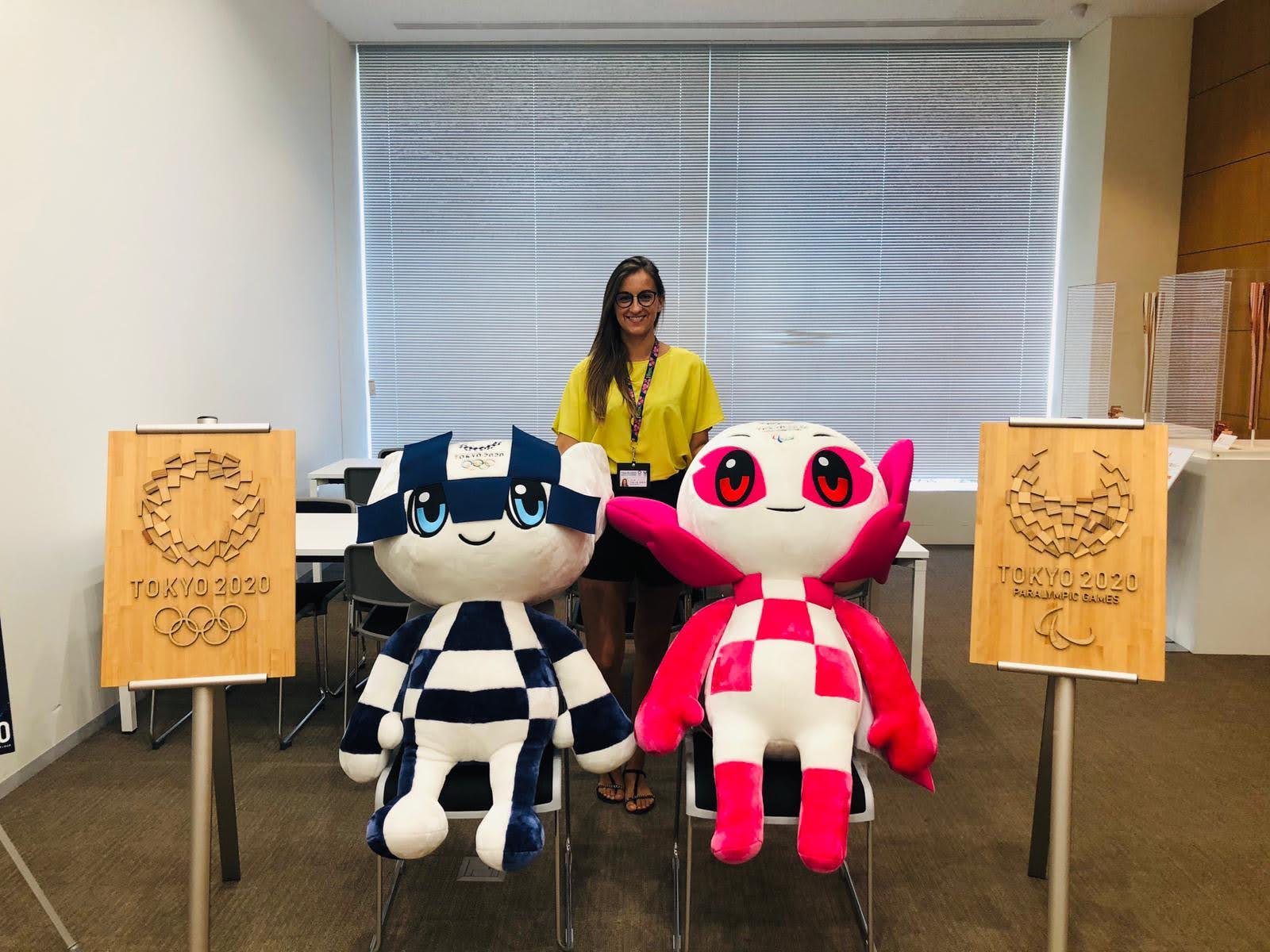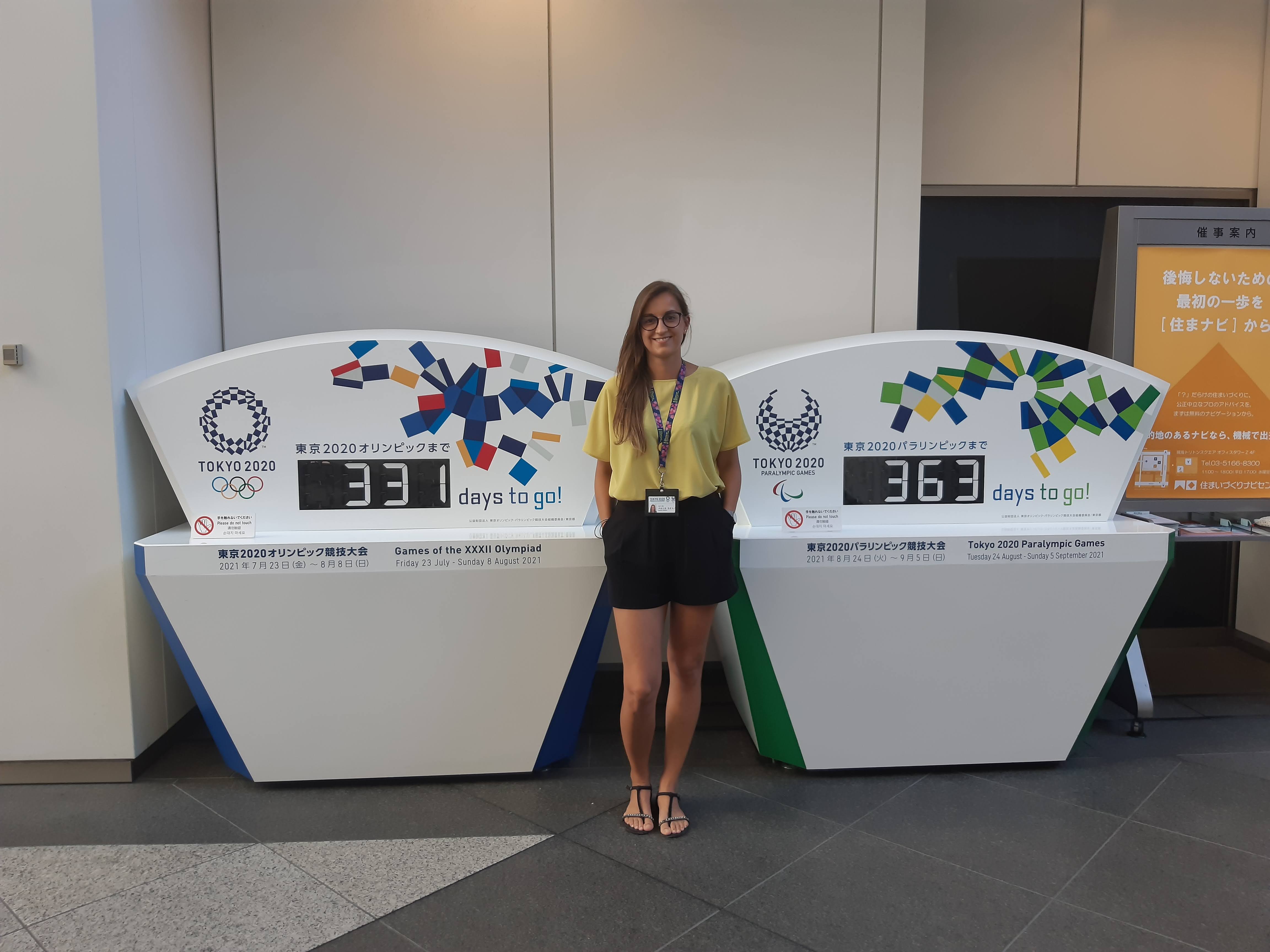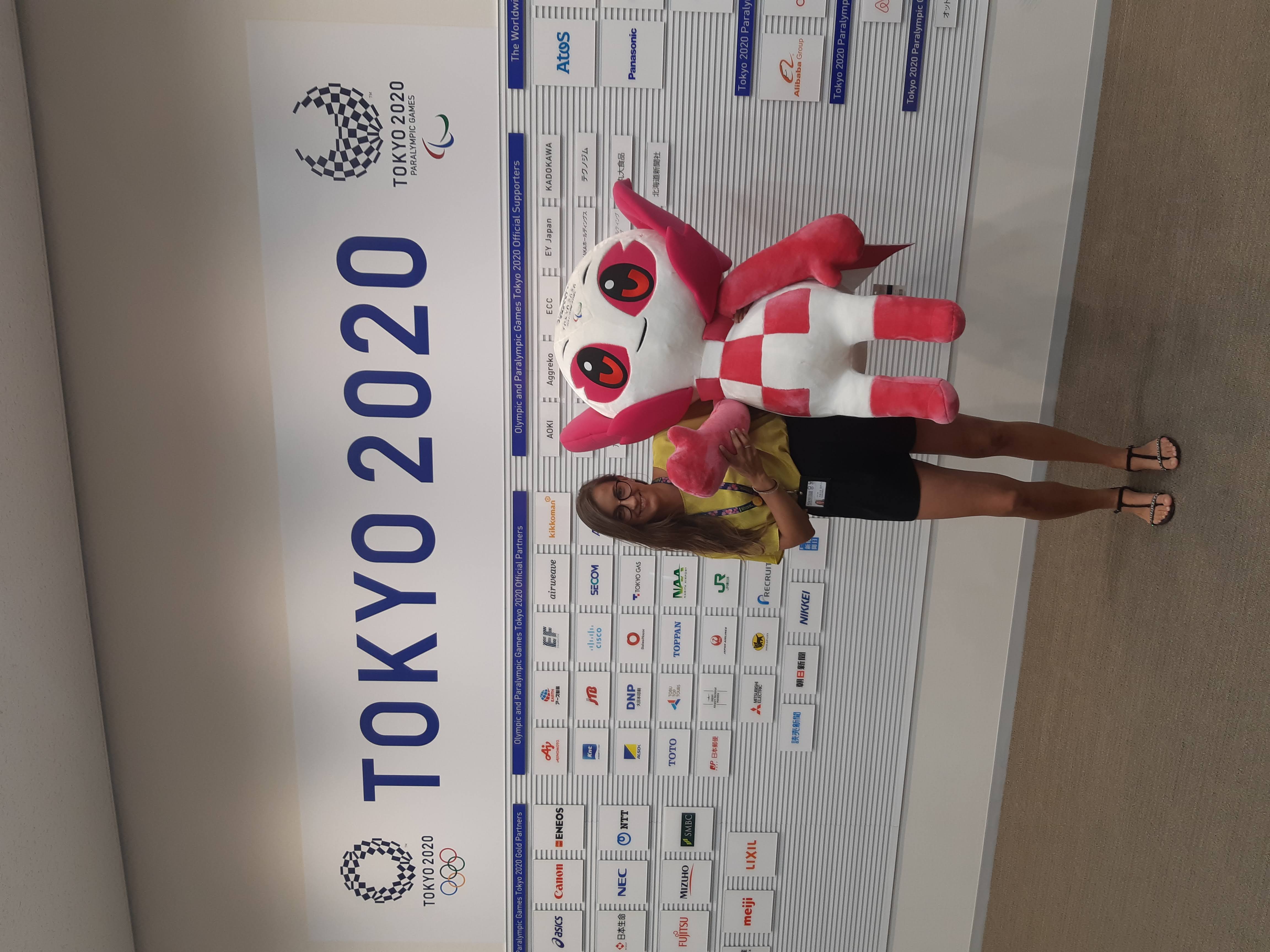Devátý ročník Evropských her pro handicapovanou mládež se blíží. Na obnovení jejich tradice se v roce 2017 podílela také Veronika Kuchtová. Ta je dnes jedinou Češkou v organizačním výboru Tokio 2020. Přinášíme vám s ní rozhovor.

Veroniko, jste jedinou českou členkou organizačního výboru olympiády a paralympiády Tokio 2020. Co přesně vaše práce obnáší?
Jsem na pozici Technical Operations Manager pro para vzpírání. Náplň mé práce je velmi pestrá. Jednou z mých povinností je zajištění různého vybavení – sportovního, technologického či například nábytku. A to do těch částí sportoviště, které bude používat náš organizační tým. Jde o hrací plochu, zahřívací plochu, tréninkovou plochu, ostatní prostory pro sportovce i členy našeho týmu. Také vytvářím návrhy plánů těch částí sportoviště, které bude náš tým používat, včetně hrací plochy. Dále plánuji, jak se budou sportovci, jejich doprovod, rozhodčí a tým mezinárodní federace po sportovišti pohybovat, tedy jejich trasy. Dohlížím na to, aby byly veškeré plány v souladu s Technickými pravidly a předpisy světového para vzpírání. Tudíž jsem také v pravidelném kontaktu s Mezinárodní federací para vzpírání (WPPO), která dohlíží na naše plánování a dává nám zpětnou vazbu.
Jaká byla vaše cesta k práci na takové sportovní události?
Nečekaná a překvapivá.
Podílet se na paralympiádě bylo mým snem od doby, kdy jsem začala pracovat v oblasti sportovních akcí pro handicapované. Nicméně neměla jsem žádný kariérní plán ani jsem nepodnikala konkrétní kroky k dosažení tohoto cíle. Někdo to může nazývat štěstím, já ale tvrdím, že štěstí přeje připraveným.
Moje cesta začala hned po vysoké škole, kde jsem studovala obor speciální pedagogika a anglický jazyk. Tehdy jsem potkala Milana Kočího a Pavla Zbožínka. Díky nim jsem měla možnost podílet se na organizaci IWAS U23 World Games Prague 2016 – Světových her handicapované mládeže do 23 let. Navždy budu vděčná za tuto příležitost a jejich víru ve mě. Dalším milníkem pak bylo znovuzaložení evropských her Emil Open organizovaných Nadačním fondem Emil s prvním obnoveným ročníkem v roce 2017. Vytváření takové akce od nuly byla veliká zkušenost. Nejen, že jsem se hodně naučila, ale mnohokrát jsem z toho od té doby i těžila. Čímž se dostávám k únoru 2018, kdy Maďarský paralympijský výbor pozval představitele Emil Open na jeho Mezinárodní konferenci para sportu. Měla jsem tu čest představit Emil Open a zúčastnit se panelové diskuze. Potkala jsem zde také spoustu významných osobností, mezi nimiž byl například i prezident světového para vzpírání, se kterým jsme probírali začlenění para vzpírání do Emil Open. Naše diskuze pokračovaly několik dalších měsíců a jednou, z ničeho nic, mi byla nabídnuta pozice, na níž jsem nyní.
Často tato událost bývá zaměňována se Světovými hrami speciálních olympiád. Jaký je mezi oběma událostmi rozdíl?
Obě události jsou neziskové organizace podporující zdravotně handicapované sportovce, ale v některých oblastech se liší. Jedním z rozdílu je kategorie handicapů - Speciální olympiáda je pouze pro sportovce s mentálním postižením, zatímco paralympiáda je určena pro sportovce s fyzickým, zrakovým a mentálním postižením. Druhým rozdílem je, že na paralympiádu se musí sportovci kvalifikovat a splnit určité výkonnostní standardy, mluvíme tedy o elitním sportu. Zatímco Speciální olympiáda vítá a odměňuje kohokoli nad 8 let, s jakoukoli schopností a věří, že sport je nástrojem k dosažení maximálního potenciálu daného sportovce. A v neposlední řadě, paralympiádu pořádá Mezinárodní paralympijský výbor (MPV), jehož Valné shromáždění se skládá ze 4 Mezinárodních organizací pro sport handicapovaných, 5 Regionálních organizací, a přibližně 180 členských zemí - Národních paralympijských výborů (NPV). Speciální olympiádu pořádá Speciální Mezinárodní Olympiáda (SMO), která má národní nadace po celém světě, které jsou financované převážně z charity.
Za Českou republiku má na starost nominaci na paralympiádu Český paralympijský výbor. Můžete mi jednoduše vysvětlit, jak taková nominace probíhá?
Mezinárodní paralympijský výbor vydává kvalifikační směrnice, které obsahují kvalifikační kritéria a stanovené kvóty pro jednotlivé sporty. Způsobů nominace je několik a liší se sport od sportu. Jedním z nich je přímá kvalifikace sportovce, což se týká například právě para vzpírání, kde je podle rankingu vybráno 8 mužů a 8 žen do každé váhové kategorie (celkem 10 kategorií). Jsou tam ale ještě další limity – každá země může poslat maximálně 8 žen a 8 mužů a mít maximálně 1 sportovce v dané váhové kategorii.
Další možností je, že sportovec získá místo v rámci kvót, které daná země obdržela. Nominace takového sportovce pak probíhá přímo Národním paralympijským výborem, který vybírá své nejlepší reprezentanty splňující kvalifikační podmínky.
První letní paralympijské hry se odehrály v Římě, a to v roce 1960. Můžete říci, kam se podoba her od té doby posunula? Tehdy se her účastnilo přes 200 sportovců. Kolik účastníků budou mít hry v Tokiu v roce 2021?
Odpověď začnu jedním doporučením pro čtenáře, a to je zhlédnutí filmu Rising Phoenix o paralympijském hnutí, který měl premiéru 26. 8. 2020 na Netflixu. Ten kromě jiného krásně ukazuje právě vývoj Paralympijských her. Doufám, že bude vznikat čím dál víc filmů a jiných aktivit, které podpoří osvětu v této oblasti.
Já osobně neskutečně obdivuji pana Guttmanna, zakladatele paralympiády, protože se zasloužil o vznik akce, která mění vnímání lidí a přispívá k lepší společnosti v tolika směrech. V Tokiu uvidí diváci 4 400 paralympioniků v 539 medailových disciplínách. No není to nádherné číslo? Každé další hry si získávají nové a nové fanoušky. Protože kdo jednou zhlédne jakýkoliv sport pro handicapované, navždy zůstane očarován.
Letní olympijské a paralympijské hry v Tokiu jsou odloženy o rok, a to kvůli světové pandemii. Uskuteční se tedy od 23. července do 8. srpna 2021. Jedná se o historicky první přesunutí termínu olympiády. Jak nyní probíhá příprava? A jak případně COVID ovlivní konání v roce 2021? Počítáte už nyní s nějakými novými bezpečnostními prvky?
Přesunutí největší sportovní akce světa, od níž se odvíjí ostatní sportovní události, navíc když jste se s takovou situací nikdy nesetkali a nemáte žádný manuál, je opravdu něco neskutečného. Obdivuji, s jakou rychlostí MOV, MPV, Tokio a organizační výbor jednají. Krátce po odkladu byl oznámen hrubý plán toho, jak vše bude následující rok a čtvrt probíhat. Do léta jsme měli s plánováním a přípravami pokračovat, jako kdyby hry probíhaly podle původního plánu. Teď od září jsme ve fázi vyhodnocování a testování. Velkým problémem jsou samozřejmě finance, takže se už potýkáme se škrty, a tím pádem musíme také měnit původní plány, nacházet nová řešení. V pátek 4. září mimo jiné proběhla první koordinační konference ohledně COVID-19 opatření, která bude probíhat pravidelně a z níž by pro nás během podzimu měla vyplynout povinná opatření. Ta následně začne každé oddělení výboru integrovat do plánování svých nových operací. Od nového roku by pak měla nastat fáze testování v podobě kontrolních aktivit nebo testovacích závodů.
Nový termín má letos kvůli pandemii také 9. ročník Evropských her handicapované mládeže Emil Open. Ten se odehraje v září v Brně. Vy jste jeho bývalou viceprezidentkou. Může být Emil Open přípravou třeba také na paralympiádu?
Určitě ano. Emil Open, stejně jako všechny jiné rozvojové akce pro mladé handicapované sportovce v jiných zemích, hraje v oblasti rozvoje sportu obrovskou roli. Velmi často jsou právě tyto akce odrazovým můstkem pro spousty budoucích profesionálních sportovců. Z řad Emil Open vzešel například Jiří Ježek, dnes šestinásobný paralympijský vítěz. Já osobně ale vidím v Emil Open a podobných projektech jinou důležitost. Sport by měl být neodmyslitelnou součástí života každého z nás. Přispívá k našemu fyzickému, ale také duševnímu zdraví a rozvoji sociálních vazeb. A to je mimo jiné jedním z pilířů Emil Open.
Tradici Emil Open jste s Pavlem Zbožínkem obnovovali v roce 2017. Jaká byla vaše role?
Řekla bych, že moje role se postupně malinko měnila. Při přípravách prvního ročníku jsme s Pavlem Zbožínkem začínali skoro od nuly a dělali jsme na všem společně. Tím myslím celý koncept her – od cílové skupiny sportovců, pravidel, až po vývoj registračního systému, webu a podobně. Já jsem měla vždy na starosti komunikaci s účastníky, správu přihlašovacího systému, webu, vytváření pravidel a jiných dokumentů ve spolupráci s řediteli sportu, a vedení manažerů jednotlivých sekcí. Nicméně celou dobu jsme byli jeden tým a řešili jsme spoustu věcí společně. Moc ráda na tyto časy vzpomínám.
Jak vnímáte dnešní podobu Emil Open?
Toto je těžká otázka, protože Emil Open je něco jako moje dítě, a proto nevím, jestli bude moje odpověď objektivní. Jsem moc ráda, že tento projekt existuje. Nepochybně dělá sport pro mladé lidi s postižením přístupnější, a to velice jedinečným způsobem. Minimálně v rámci Evropy nemá konkurenci – neexistuje jiná sportovní akce pro mládež s postižením bez startovného. A o tom, že má opravdu velký ohlas ve spoustě zemí, svědčí i fakt, že se bude konat i letos za tak nelehkých podmínek. Je úžasné vidět, kolik mladých sportovců se na Emil Open každoročně těší. Organizátoři mají můj velký obdiv. A moc ráda bych jim popřála hodně štěstí, pevné nervy a všem účastníkům krásné sportovní zážitky!

